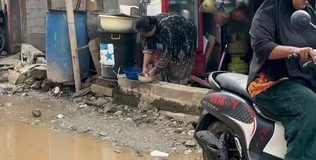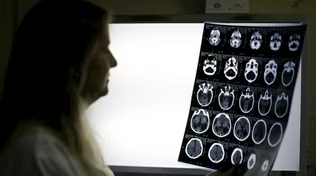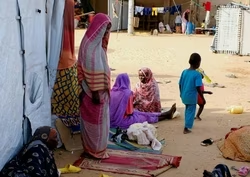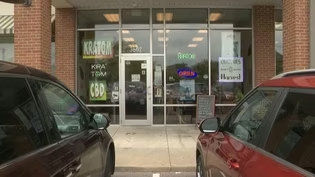
November 9, 2025 - PBS News Weekend full episode
11/9/2025 | 26m 45sVideo has Closed Captions
November 9, 2025 - PBS News Weekend full episode
November 9, 2025 - PBS News Weekend full episode
Problems playing video? | Closed Captioning Feedback
Problems playing video? | Closed Captioning Feedback
Major corporate funding for the PBS News Hour is provided by BDO, BNSF, Consumer Cellular, American Cruise Lines, and Raymond James. Funding for the PBS NewsHour Weekend is provided by...

November 9, 2025 - PBS News Weekend full episode
11/9/2025 | 26m 45sVideo has Closed Captions
November 9, 2025 - PBS News Weekend full episode
Problems playing video? | Closed Captioning Feedback
How to Watch PBS News Hour
PBS News Hour is available to stream on pbs.org and the free PBS App, available on iPhone, Apple TV, Android TV, Android smartphones, Amazon Fire TV, Amazon Fire Tablet, Roku, Samsung Smart TV, and Vizio.
Providing Support for PBS.org
Learn Moreabout PBS online sponsorshipJOHN YANG: Tonight on "PBS News Weekend."
Day 40 of the government shutdown as the Senate holds a rare Sunday session to try to break the stalemate.
Then a new study suggests a troubling connection between medical imaging and pediatric cancer.
And the effect ending USAID funding is having on countries like Indonesia and on America's image abroad.
JEFF COHEN, Former USAID Mission Director, Indonesia: How now when the government of the United States says to the government or the people of Indonesia, we're here to support you.
How can they believe that?
(BREAK) JONH YANG: Good evening.
I'm John Yang.
There's been another swing of the seesaw legal battle over the federal nutrition program known as SNAP, as tens of millions of low-income Americans wait to see if they get benefits payments this month.
The Trump administration is demanding that states that followed a judge's orders and paid out full benefits this past week, undo it because the Supreme Court later blocked that ruling for the time being.
This comes as the Senate holds a rare Sunday session.
Majority leader John Thune of South Dakota set up potential deal to end the 40-day shutdown is coming together but it wasn't a done deal.
Air travelers at 40 busy airports face a third day of reduced flights.
Transportation Secretary Sean Duffy warned about it lasting until Thanksgiving.
SEAN DUFFY, Secretary of Transportation: It's only going to get worse.
I looked to, you know, the two weeks before Thanksgiving.
You're going to see air travel be reduced to a trickle.
JOHN YANG: According to the flight tracking website, FlightAware, so far today, more than 2,000 flights at U.S.
airports have been canceled and more than 7,000 delayed.
Super typhoon Fung-wong hit the Philippines' northeastern coast today, killing at least two people and forcing the evacuation of more than a million from areas prone to flooding and landslides.
The storm battered the region with strong winds and heavy rains, knocking down power lines as people sought shelter.
It's the biggest to threaten the Philippines in years.
Just this past week, another typhoon caused widespread destruction and killed more than 200 people.
Hamas handed over the remains of an Israeli soldier killed in 2014 hours after the ceasefire ended that year's Gaza war.
Forensic testing confirmed that the body was that of Hadar Goldin.
It brought bitter closure to his family who had campaigned for his return.
Hamas said it found Goldin's body yesterday in a tunnel in Rafah.
Israel is still awaiting the return of the bodies of four hostages taking in the October 7th attacks.
Former long-time NFL commissioner Paul Tagliabue has died.
His 17-year tenure was a period of league expansion and growing fan interest and network T.V.
revenue, as some teams' value grew tenfold.
He restored labor piece after a series of work stoppages and implemented a tough substance abuse policy.
But critics say he failed to act quickly or firmly enough to deal with player concussions.
Tagliabue's family said the apparent cause of death was heart failure, complicated by Parkinson's disease.
Paul Tagliabue was 84 years old.
In Sudan, aid group say tens of thousands of people have fled the violence of the city of Al-Fashir and the Darfur region of the northeastern African nation, which is in the midst of a more than two-year civil war.
In makeshift camps, they were counted what they saw this past week, what a paramilitary force captured the city and killed hundreds of people.
MUBARAK, Displace Sudanese Man (through translator): Fifty or 60 people in a single street or 10 or 20 people.
They killed them bang, bang, bang.
Then they would go to the next street and again bang, bang, bang, that's the massacre I saw in front of me.
JOHN YANG: This follows at an official declaration that famine is spreading through Sudan.
Earlier, I spoke with Sheldon Yett, the UNICEF representative in Sudan.
SHELDON YETT, UNICEF Representative in Sudan: I just came back from towns on the outskirts of Al-Fashir, nearby towns.
I talked to a woman who had walked for days and days and days.
This was just before the huge explosion of violence on October 26.
They talked about not knowing where their husbands were, not knowing where their sons were.
They talked about having to eat animal feed, having nothing.
And of course, it was a city that had been under siege for some 600 days.
I had more than one individuals that I was speaking to just break down in tears because they had no idea what had happened, what happened to their children, what happened to the rest of their family.
They had no idea what would happen to them next.
There's this level of anxiety, of fear of knowing that they've been displaced once and fearing that to be displaced yet again as this conflict continues to expand.
JOHN YANG: And tell us what UNICEF is doing on the ground there.
What are your efforts alike?
SHELDON YETT: Now our efforts are really targeted on those people who have managed to survive the massacres that have happened in Al-Fashir.
We've got some 80,000 people who've left the city.
They've gone to various towns in -- around North Darfur.
UNICEF is making sure they're screened for malnutrition, getting access to water and sanitation, giving psychosocial support.
This population has been exposed to huge levels of sexual violence.
Many women have been raped.
These children have been just exposed to the most horrific violence, so lots of psychological scars.
JOHN YANG: And, of course, recently the group that monitors -- the hunger monitoring group, has confirmed famine in parts of Sudan.
What is this exodus of displaced people done to that?
SHELDON YETT: One of the areas that has famine is this area in Al-Fashir.
This is a conflict-induced famine.
No doubt about it.
Sudan is a bread basket.
It's fed much of the Middle East.
But in those areas of conflict, we have famine.
We have people who had nothing and now, of course, have extreme malnutrition.
JOHN YANG: The monitoring group said that they see the famine and the risk of famine in Sudan are only symptoms of a broader deepening crisis.
Is that how you see it as well?
SHELDON YETT: Yes.
I think that's exactly right.
Now -- we're now into two and a half years of this conflict.
And the front lines continue to move.
The number of displaced continues to grow.
There are some 30 million people in this country who need humanitarian assistance, half of them children.
And some 80 percent of children in this country are not in school.
JOHN YANG: You've listed off a number of problems.
Is it possible to say what the top priority should be or what UNICEF's top priority is?
SHELDON YETT: Well, I mean, it depends on where in Sudan.
In those parts of the country, such as Al-Fashir and other parts in North Darfur and the Kordofan, we need to see an end to the violence itself.
We need to make sure that children are safe, that women, that community members, that schools are not being targeted, that people can have a normal life and can feel free to go outside without fear of being shot.
JOHN YANG: What's the latest you're hearing from Al-Fashir and Darfur?
SHELDON YETT: Unfortunately, the instability, the violence is continuing.
The numbers continue to grow.
People are walking for days out of the city to surrounding communities, to host communities.
They're arriving malnourished.
They're arriving dehydrated.
They're arriving on death's door.
We're hearing about many unaccompanied children that must be reunited with their families, or the families are still alive and must get the support they require.
It's what to grow up to be full citizens of their country.
JOHN YANG: There's been such intense global attention on Gaza.
Is there any sense that the attention has been less on Sudan or it's been somehow overshadowed that perhaps the world is focused elsewhere?
SHELDON YETT: Yeah.
I mean, it's not a competition, of course.
But this is the largest humanitarian emergency in the world.
And you wouldn't know it by listening to the world's media.
And I've been doing this work for 30 odd years, and I've never seen anything the scale of what we're seeing in Sudan.
I was in Rwanda.
And I see echoes of what I saw there, patterns of killings that we saw there.
But ultimately, this is a political issue.
This is a -- this is a war.
Humanitarians can only do so much.
And we need the resources to be able to provide the growing levels of need that are affecting children and their families in this country.
JOHN YANG: Sheldon Yett, UNICEF Sudan representative.
Thank you very much.
SHELDON YETT: Thank you.
JOHN YANG: Still to come on "PBS News Weekend," the link between radiation from medical imaging and pediatric cancer.
And why government regulators want to ban a key ingredients in a popular herbal supplement.
(BREAK) JOHN YANG: Medical imaging, like X-rays and CT scans, are a routine, non-invasive, and painless tools for doctors to make diagnoses.
But a recent study of about four million U.S.
and Canadian children published in the New England Journal of Medicine, suggests that the radiation exposure from imaging could pose a risk.
It estimates that about 10 percent of blood cancers like leukemia and lymphoma, in the study group, may have been attributable to radiation exposure from medical imaging.
Dr.
Rebecca Smith-Bindman is the lead author of the study and she's a professor at the University of California, San Francisco.
Dr.
Smith-Bindman, is this the first time first study to focus on children and in such a large scale?
DR.
REBECCA SMITH-BINDMAN, University of California, San Francisco: It is.
It's the first study that looks at children and all kinds of medical tests that they observe.
And then we follow those children for a long period of time.
We added up the cumulative dose of radiation from all those tests, identified which children were diagnosed with hematologic cancer to allow us to estimate the risks of those exams.
JOHN YANG: Are children particularly vulnerable to exposure to radiation?
REBECCA SMITH-BINDMAN: They are.
They're vulnerable, we think, for two reasons.
First, because they have a long life expectancy in front of them and the risk of developing a cancer from radiation is cumulative over time.
And the risks last a whole lifetime.
But also, their cells are rapidly dividing, they're growing and that makes them particularly vulnerable to the kind of damage that's caused by the radiation.
JOHN YANG: The studies I understand it said that even low levels of radiation from one or two CT scans can increase the risk.
What's the significance of that?
REBECCA SMITH-BINDMAN: It's not just CT scans that increase the risk.
It's all kinds of radiation.
So we use radiation from all different kinds of medical tests, from radiographs like you would get for a bone fracture or to look for pneumonia, all the way up to higher dose studies like fluoroscopy or CT scans.
And we found that the risk of hematologic cancer, even at relatively low doses, is increased.
So it really underscores the need to minimize radiation.
JOHN YANG: Are doctors overusing medical imaging?
I mean, it becomes fairly standard in my experience to do either an X-ray or even a CT scan very early on.
REBECCA SMITH-BINDMAN: I think that's a really important point.
And I think what our research highlights is the need to justify every exam that uses radiation.
And on top of that to make sure that the doses we use for those exams are as low as possible.
We're hoping to learn something from this exam and not to sort of just get the exams because we can.
Parents really need to be informed that the medical imaging could really help their child, but it also could be unnecessary.
And so really to think very carefully every time an exam is ordered and every time you ask for an exam.
JOHN YANG: Are there guidelines about this?
Guidelines the physicians have to follow or if they're not, should there be?
REBECCA SMITH-BINDMAN: I think we need more rigorous guidelines that really help guide what tests we do in different circumstances.
I can give you a concrete example.
We know that to diagnose appendicitis, we could use ultrasound instead of CT scans.
And for younger children, we often do start with ultrasound.
And in older children, we often go right to CT, which has much more radiation than, you know, even just getting some kinds of radiographs that are necessary.
So we need much more explicit guidelines and we need to do a better job as physicians of following those guidelines and avoiding the higher dose studies if it's possible.
JOHN YANG: You mentioned earlier parents.
What should parents think about?
What should parents do if a doctor suggests or orders medical imaging for their child?
REBECCA SMITH-BINDMAN: So I think it's a -- it's a little bit of a nuanced situation.
Parents should absolutely not refuse medical imaging, but I think they can open a dialogue and ask, do we really need this test?
I'll give you an extreme example.
The child was in the car accident and has severe injuries.
You need to do the CT scan and you need to do it right away.
So it's circumstances like that.
You just get the scans.
In other situations, the doctor orders a test in an outpatient setting.
I think it's appropriate for the parents to discuss it with the physician.
Do we really need the test?
Do we need the test now?
And if we do need a test now, is it possible to replace a radiation-based test with a non-radiation-based test such as MRI or ultrasound that doesn't use ionizing radiation and doesn't increase the risk of cancer?
So I think it's that dialogue that's so important.
JOHN YANG: Dr.
Rebecca Smith-Bindman of UCSF, thank you very much.
REBECCA SMITH-BINDMAN: Thank you so much for covering this important topic.
JOHN YANG: For centuries, people in Southeast Asia have used the leaves of kratom trees as a home remedy to soothe nerves and ease pain.
Recently, its popularity has exploded in this country as a way to alleviate anxiety and the effects of opioid withdrawal.
These products are widely available at smoke shops at gas stations, but kratom is poorly regulated and synthetic versions contain high concentrations of a powerful compound that U.S.
officials say should be restricted.
Ali Rogin takes a look at this controversial herbal drug with Kirby Wilson, senior politics reporter at the "Tampa Bay Times."
ALI ROGIN: Thank you so much for being here.
Let's first talk about what kratom is, how it's traditionally been used in other cultures, and how it's showing up here in the United States.
KIRBY WILSON, Senior Politics Reporter, Tampa Bay Times: Yes.
So kratom is a very interesting substance with a long history.
It's a tree that's grown in Southeast Asia, primarily in Indonesia.
And it's been used there for centuries as a medicinal sort of home remedy for a variety of ailments from an analgesic pain treatment to curing indigestion.
And so it's brewed into teas.
There are a lot of the indigenous people in Indonesia see it as sort of a cure for what (INAUDIBLE) kind of thing.
It is not legal to import into the United States, but it gets here anyway, and people use it here for a little different reason.
ALI ROGIN: Yes.
So tell me about that.
You've reported extensively on this specifically about how it's showing up around the Tampa area in Florida.
But what have you found in the course of your reporting on it?
KIRBY WILSON: It's been an interesting sort of dovetail with the opioid crisis in America, because there have been a lot of people that have been seeking treatment for that particular affliction.
They get addicted to painkillers, and they want to weigh out, but they don't have an easy resource.
So people have used it to wean off of opioid addiction, which is honestly probably a societal good that they find somewhere to turn that isn't another street drug or back to opioids.
But the problem with it is that this is, in a lot of places, is entirely unregulated.
And so people are using the substance that had been used for centuries for a completely different purpose in a way that authorities aren't really getting their arms around or sort of understanding.
And the -- there's not really well established limits on dosing or what -- how much is wise to use, what form of it is wise to use, and in what circumstance.
ALI ROGIN: Why is it, Kirby, so difficult to regulate kratom products?
KIRBY WILSON: Really for the same reason it's so difficult to regulate anything.
It's difficult to know the exact science of how things work on the body.
Still, dosing limits are poorly understood in general, because everybody's body is different.
So doctors have some sense of how much of a certain drug could harm or kill a person.
But that is -- that has only understood after extensive clinical trials and testing and scientific evidence.
There is great promise.
Don't get me wrong.
I'm not here to contribute to some sort of panic around kratom.
People are using it safely, and it is benefiting them for sure.
But they are using it in an off label way.
And when you're using anything in an off label way, dangers are present.
And especially when there is an industry that is incentivized to create the most -- the most concentrated possible iteration of this substance that people are using as a medicine, that's when you run into trouble.
ALI ROGIN: So let's talk about those iterations.
Let's talk about the difference between kratom the plant and some of the compounds found in it, which appear in different levels of concentration in some commercial products.
And then there's another factor of this, which is the synthetic versions of those compounds, which I know is kind of in its own category right now.
Walk us through all that.
KIRBY WILSON: Yes.
So the thing that's been in the news most recently is a product called 7-hydroxymitragynine, which is a -- or mitragynine you might hear it pronounced, which is a -- an alkaloid of the kratom plant.
Basically, it's a chemical that's found in the natural kratom plant at very low doses.
Scientists who have studied this chemical are worried about its potential for abuse and addiction.
It mimics opioids in the way that it interacts with our brains.
And it may contribute to respiratory depression, which is ultimately what kills people when they overdose on opioids.
So the Trump administration and some -- even some states like Florida have said, no more 7-OH, which is the street name for 7-hydroxymitragynine, no more 7-OH.
It's banned.
We're taking it off the streets entirely.
Set that aside because there is a whole other legion of kratom products that are not 7-OH, that are sort of akin to what you'd find in a traditional kratom tea.
If you go to a kava shop, you can get a kratom tea and it's more or less similar to the product that people have been drinking for centuries in Indonesia.
Then set that aside, and there are these other kratom products that are not 7-OH, but have highly concentrated forms of mitragynine, that is the operative ingredient in kratom.
And the effects of that are sort of unknown when it comes to these high concentrated products, but they exist and they're basically ubiquitous anywhere.
Anyone can buy them online in almost any state.
ALI ROGIN: And the federal government and some of these state governments have made a distinction between the kratom product itself and the synthetic derivations of it.
Is that the way to deal with this?
KIRBY WILSON: Yes.
I think it is wise to break off and regulate the two as dissimilar products because even the kratom industry, which I've reported on pretty aggressively and critically, says that 7-OH shouldn't be offered as a product.
So if you're concentrating that and putting that into a product, almost everyone who's reasonable in the kratom space thinks that there is at least a major -- a major problem with that.
As far as the other kratom regulations go, you know, there's reasonable minds can disagree about how best to do that, but the urgent -- and the urgency is certainly there because people, again, are using a product that is not a drug like a drug.
And so there are always dangers that are going to be inherent with that.
But the uptake of kratom is so widespread throughout the country that there would be a lot more harm than we have found if it were as dangerous as opioids.
ALI ROGIN: Kirby Wilson with the "Tampa Bay Times."
Thank you so much.
KIRBY WILSON: Thank you.
JOHN YANG: The ripple effects of the Trump administration's elimination of USAID are being felt in dozens of countries around the world where the agency supported initiatives ranging from public health programs to infrastructure and climate resilience projects.
Angeles Ponpa, from Northwestern University's Medill School of Journalism, traveled to Indonesia to see the effect on one of the world's fastest sinking cities.
ANGELES PONPA: Outside the capital Jakarta and the Tanah Merah neighborhood, residents struggled for years to get access to clean water.
In 2016, USAID offered a program, IUWASH, that helped disadvantaged families obtain clean water.
ABDUL SUKUR KADIR, Resident, Tanah Merah (through translator): That was everybody.
For me personally, it was really helpful.
ANGELES PONPA: Prior to USAID's efforts, Abdul Sukur Kadir pulled unsafe groundwater from a nearby well that was dug by hand.
ABDUL SUKUR KADIR: Once I started to use USAID water, I stopped using the pump to extract groundwater.
I was very happy and grateful.
ANGELES PONPA: Decades of groundwater extraction have caused Jakarta, the capital of Indonesia to sink.
Meanwhile, with climate change, the seas are rising, making flooding worse and sending salty water into groundwater.
Sukri Ali is the neighborhood chief of Tanah Merah.
SUKRI ALI, Neighborhood Chief, Tanah Merah (through translator): That's why the only option was the initiative from USAID.
And we were very grateful to USAID from America.
ANGELES PONPA: The program installed a master meter to connect families to city water.
With a steady flow at their taps and affordable rates, they no longer needed to drill wells or rely on costly jugs of water from local sellers.
Even so, the city water supply available to USAID was limited.
The master meter program reached only about 18 percent of families in the village.
SUKRI ALI (through translator): When there are countries or populations that aren't receiving such support from their governments, and USAID are stepping into help, I think it would be a mistake for world leaders to stop those efforts globally.
ANGELES PONPA: Jeff Cohen was USAID's most recent mission director in Indonesia.
He says the decision by the Trump administration to cut USAID funding will have dire consequences.
JEFF COHEN: Without USAID's funding there, all the communities where we're working are either going to have to do it on their own or find somebody else to be that catalyst.
And honestly, some of them never will get access to clean drinking water, will never get access to safe sanitation until somebody replaces us.
And I don't think that's going to happen.
And so I think you're going to see the communities where we worked, increased waterborne diseases.
You're going to see sick kids who shouldn't have been sick if they had access to cleaner water.
ANGELES PONPA: Secretary of State Marco Rubio defended the administration's decision to defund USAID in January.
MARCO RUBIO, U.S.
Secretary of State: Yes, we canceled a bunch of contracts in USAID.
Some were stupid and outrageous.
Others didn't serve the national interest and others we kept.
It is not charity.
Foreign aid is not charity.
ANGELES PONPA: After decades representing the United States abroad, Jeff Cohen has seen foreign assistance strengthening U.S.
influence.
He believes canceling USAID will hurt U.S.
relations with countries like Indonesia.
JEFF COHEN: How now when the government of the United States says to the government or the people of Indonesia, we're here to support you.
How can they believe that?
ANGELES PONPA: As Indonesia confronts the pressures of rapid climate change and urban growth, the question is whether its government can keep the taps running without help from USAID.
For "PBS News Weekend," I'm Angeles Ponpa for the Medill School of Journalism in Jakarta, Indonesia.
JOHN YANG: And we leave you tonight with the world's most watch E-sporting event, the League of Legends World Championships.
Eighteen thousand people packed in arena in Chengdu, China for the five-hour championship battle.
Team T1 defeated Team KT, both from South Korea, to win their third consecutive title.
At its peak, last year's tournament drew 50 million viewers around the world.
And that is "PBS News Weekend" for this Sunday.
I'm John Yang for all of my colleagues, thanks for joining us.
Have a good week.
How the loss of USAID affects Indonesia’s climate fight
Video has Closed Captions
Clip: 11/9/2025 | 3m 57s | How the loss of USAID funding affects Indonesia’s ability to fight climate change (3m 57s)
News Wrap: Senate works over weekend as shutdown continues
Video has Closed Captions
Clip: 11/9/2025 | 2m 28s | News Wrap: Senate works through weekend as shutdown enters 40th day (2m 28s)
Study suggests risk of pediatric cancer from medical imaging
Video has Closed Captions
Clip: 11/9/2025 | 5m | New study suggests link between medical imaging and pediatric cancer risk (5m)
UNICEF: Children face ‘horrific violence’ in Sudan crisis
Video has Closed Captions
Clip: 11/9/2025 | 5m 33s | Children exposed to ‘horrific violence’ in Sudan’s civil war, UNICEF says (5m 33s)
Why regulators want to ban a key ingredient in kratom drugs
Video has Closed Captions
Clip: 11/9/2025 | 6m 34s | Why regulators want to ban a key ingredient in kratom, a popular herbal supplement (6m 34s)
Providing Support for PBS.org
Learn Moreabout PBS online sponsorship
- News and Public Affairs

FRONTLINE is investigative journalism that questions, explains and changes our world.

- News and Public Affairs

Amanpour and Company features conversations with leaders and decision makers.












Support for PBS provided by:
Major corporate funding for the PBS News Hour is provided by BDO, BNSF, Consumer Cellular, American Cruise Lines, and Raymond James. Funding for the PBS NewsHour Weekend is provided by...




